In conversation with the Water Warrior – Ayyappa Masagi
Article By Anand Baskaran and Nikhil Vashishtha
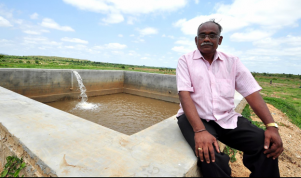
Water Warrior – Ayyappa Masagi
On a visit to a permaculture-based organic farm in Andhra Pradesh, we learnt about Ayyappa Masagi, who had helped the farm in one of the most rain-deficient areas in South India, become water-sufficient. A man-made lake abounding with blooming lilies and lotuses, and the tender green leaves amidst the surrounding dry soil stood testimony to the impact of the water sufficiency project.
The team at ACROPOLIS contacted Mr.Ayyappa Masagi, who readily agreed to an interview at his office in Sahakaranagar, Bangalore. Our research prior to the meeting showed him to be a man of many achievements and much renown, both in India and abroad – earning him the epithets of Water Warrior, Water Doctor and Water Gandhi, among others. The Water Warrior we met however, struck us as down-to-earth, humble and at the same time, as a man of great conviction and strength.
The edited interview with Mr. Ayyappa Masagi follows.
The Water crisis
ACROPOLIS: While at a larger scale – national and global – there is talk of a water crisis, many in Bangalore and in numerous other locations in India experience a shortage of water, or intermittent water supply. Common perception is that factors like changing rain patterns are contributing to this shortage. What is your perspective on the “water crisis” in India?
Ayyappa Masagi: People say that the water crisis is because of erratic rainfall or shortage of rainfall. But in my observation, the rain pattern and amount of rainfall is more or less the same – the only thing that is changing is the days on which rainfall is received. There is an old Kannada saying that goes “If the shepherd puts on his shawl, rain will follow soon”. This is to indicate how closely in tune with nature people were, they understood the signs and subtle changes in nature. This sensitivity is absent nowadays, particularly in urban areas.
India is an environmentally rich country, and a water crisis can certainly be averted here. Whether we face a water crisis, or experience water-sufficiency and even water-abundance is down to the mindset of people. With the right awareness, we can bring a shift in mindset, and by equipping ourselves with the right knowledge, we can win the War on Water crisis.
Over the last 30 years, I have built my knowledge, and developed, tried and tested various techniques and technologies connected to the conservation and right utilisation of water. I am confident that given a chance, in just 2 years, I can help the whole of India become water-sufficient! I cannot do it alone, of course – I will require support, and I will train many more water warriors who will make this possible.
Approach to Water conservation
ACROPOLIS: What is your approach to water conservation and what you have called the war against water crisis?
Ayyappa Masagi: I co-relate all my life experience to the Environment. My intention is to protect land, water and people – I’ve written a book in Kannada about this too, it is titled Nela, Jala, Jana (Kannada for Land, Water, People). This book was published in 2003-04, and is now a fairly famous book – thousands of youth are motivated by it. My intention is to work continuously – While I have received awards, recognition and support, I do not work for awards. My vision is to make this country a water-sufficient nation.
It is also important that after my death, my concepts should be alive – my aim is to train more and more water warriors, educated farmers, and towards this, to demonstrate more and more projects that are successful.
My concept is to put more [water into the groundwater reserves], and take less. Unfortunately, people tend to follow the opposite – they draw and consume a lot of water, but little or no water is fed back into the ground water reserves. Rainwater and Greywater alike are channelled to the sewers. Did you know that the increase in sea levels in the last century is also because we are letting so much of our water into the seas and oceans, instead of into the ground?
At the same time, people complain of water shortage – In Bangalore for instance, with the amount of rainfall we receive, if rainwater is harvested on the streets, 1 kilometre of road can collect as much as 3 crore litres of water annually! At a national level, if we harvest just 30 – 40 % of the rainwater that India receives, the nation can be water-sufficient.
Formally, my work is in four streams – Industry | Urban | Rural | Agriculture. Across these four streams, with the same common principles, I have developed and successfully tested over a 100 different techniques, and apply these as a 360 degree pilot: pioneering in the four sectors and directions. Financially, I work with a cross-subsidy business model. I charge those who have money and land (Industries, Companies through their Corporate Social Responsibility initiatives, and individuals), and to those who do not, I am able to benefit them by subsidising the charges. I charge for my expertise and workshops, so that it is the serious ones who take it up. I have observed others who have worked in the social field, and learnt from them. For instance, the cross-subsidy business model falls in between the approaches of Rajendra Singh in Rajasthan who received a lot of foreign funding and worked with that alone; and on the other hand, Anna Hazare whose development initiatives utilised government support.
I also work to create awareness about the need and ways to work with water (I apply the 3 R’s – Rebranding / Repositioning / Renewal). This is important, as generally speaking, there is a large gap in awareness among people about water-related issues and solutions. Perhaps only 10% of the people are really impacted by such awareness initiatives, and only 2 – 3 % will actively take the cause up immediately – this is good too, it is them that I work for.
Motivations and early beginnings
ACROPOLIS: As you’ve mentioned, for the last 3 decades you have been very active in the field of Water conservation. Could you tell us about how this journey began, and what motivates you to be a Water Warrior?
Ayyappa Masagi: My drive to work in the field of Water conservation was triggered very early on, in my childhood. I couldn’t pursue it as a field in a full-time role until over two and a half decades of work in the manufacturing industry, but the vision was there, and it was triggered at the tender age of four!
In our village in Gadag, Karnataka, we had a problem with drinking water – there was no shortage of water per se for domestic usage, but because the water was very hard, and hence not suitable for drinking. Consequently, my mother had to bring water from the stream every day, which was situated at a distance. And I would go with her to help – as a four-year old boy! And this had to be done early in the morning, at around 3:00 or 4:00 AM. We would have to walk 1.5 km to the stream, and then walk back the same distance bearing the weight of the water. That made me determined, even at that age, that I will bring a solution for the shortage of drinking water. I decided along the way that once my education is completed and my family is set up, regardless of my job, I will come to the field of water and find a solution. So you could say that my journey to being a Water warrior started when I was still a child.
There are a couple more instances I would like to share, that have contributed to strengthening my drive to work in this field.
Two particular visits to villages for surveys left an impact on me – in one of them, when I knocked on the door of one of the residents there and asked for water to drink, the woman at the door told me that there was enough and more water to use for domestic purposes but none to spare for drinking. And in another village I was surveying, when I was looking for water to wash, I was told that I could get any amount of tender coconut water to use, but not water! This strengthened in me the realisation of the need for water harvesting and conservation practices.
In 1994 I purchased 6 acres of land – this is because in my childhood I saw the landlords tormenting my father. So I had decided it was important to have my own land to cultivate. I started working the land, and was successful in the agricultural venture. Seeing this success, I decided to spread the word of the practices I was applying – hence I started the Water Literacy Foundation (Jala Shikshana Aandolana). Then, there was a cyclone and resultant floods, and my hut was destroyed. I had to spend a whole night taking refuge on a tree! Looking down at the torrent from the tree, it struck me – there is so much water, but it is just flowing away. Why should I not direct this water to my borewell so I can use it? I took this spark of inspiration while atop a tree and it directed my work!
What can we do, at the individual and community level?
ACROPOLIS: For someone in the city who is eager to start taking steps to conserve water, what would you advice? Where can one begin?
Ayyappa Masagi: At the individual level, I recommend incorporating techniques and practices connected to roof rainwater harvesting, and greywater harvesting. There are good, simple techniques available that require a small investment. One can adopt simple practices – for instance, replacing regular sinks with shallow-depth sinks that make one more conscious of the amount of water that we are using or wasting when we open our taps. And to become aware of water leakages, and fix them immediately – a seemingly small leakage of 1 drop of water per second leads to a loss of 60 – 70 litres per day!
For those who are more interested, it is also important to get aware that there are 4 levels at which water can be harvested – Sub-surface, Sub-soil, Deep-soil and Groundwater. People tend to focus on only one of these aspects, and neglect the others. In a very simple way, our forefathers practiced a way of daily living that naturally included all these – for instance, all the grey water was poured out into the soil. With the structures and daily habits we have today, we need to get more aware and change our practices.
At the core of it, Water conservation should come from the heart.
Looking ahead
ACROPOLIS: What is your outlook for the future of the war on water crisis, and what are your plans?
Ayyappa Masagi: I am optimistic. Water awareness is growing – everyone is afraid of running out of water, so awareness is picking up. To further increase the awareness, we need multiple efforts – I recommend that water literacy be included in the curriculum at schools and colleges. And individuals can play their part too – wherever there are opportunities, where people are gathered – in celebrations, functions – any of us who have equipped ourselves the knowledge, and have the opportunity, we can spread the word, so that more and more people will learn about it.
My plans for the future include training more and more water warriors – like I said before, my knowledge and techniques should continue even after I am gone. I also want to produce a film on the War on Water crisis – this way, more people can learn about these matters. I am currently looking for support to produce such a film.
Overall, when I look towards the future, I am hopeful – If we act, we can definitely avert a water crisis. I have learned through my experience that it only seems impossible until it’s done! The Youth have a big role to play in all of this. My request to the youngsters is: come to this field. Even part-time. Support villages, support water, support the Environment. Through monetary means, in-kind or through knowledge and awareness. My advice is to start small, and do what you can – spread the message and create awareness, for instance. It can really make a difference. I am happy to say that a lot of youngsters employed in the IT industry are now coming forward to support my initiatives.
– – – – –
This article is based on interview conducted by the Author/s with Mr. Ayyappa Masagi.
Image Credit: photo clicked / received with permission for use by Author/s of this Article.
Image Credits: photo clicked / received with permission for use by Author/s of this Article.
The entity posting this article assumes the responsibility that images used in this article have the requisite permissionsRead the original article on http://acropolis.org.in/2018/10/05/acropolis-oct-dec-2018/
Permissions required for the publishing of this article have been obtained
Article References
Article is based on interview conducted by the Author/s with Mr. Ayyappa Masagi.
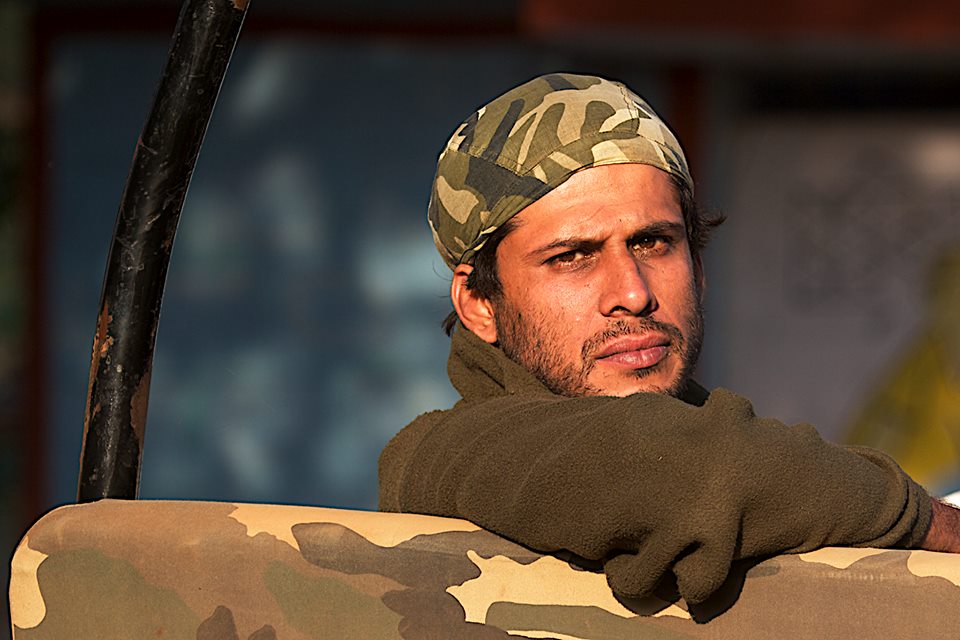
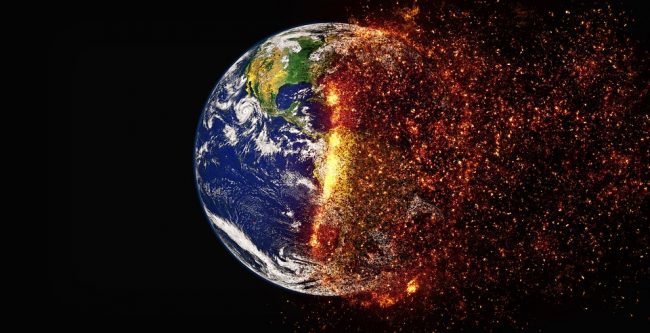
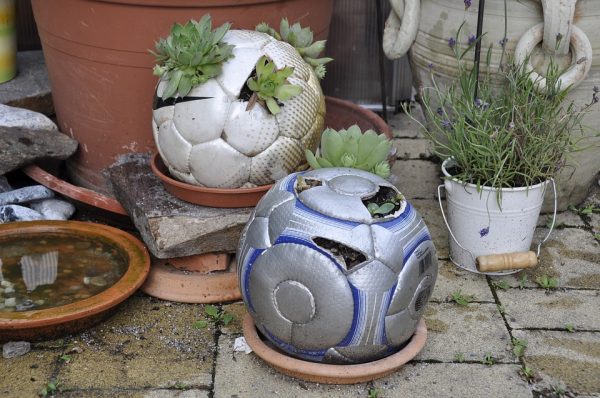
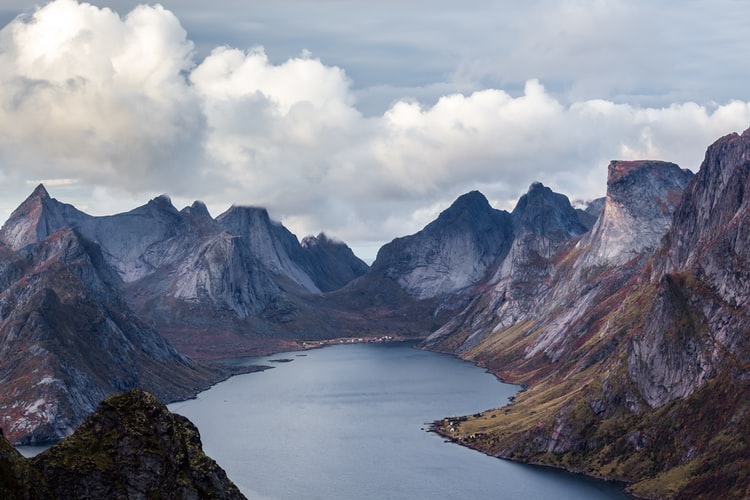
What do you think?